Meet our winter stars who are working to keep patients and staff safe across our trust over the coming weeks and months. Winter is a really challenging time in hospitals across the NHS. Our staff are doing an amazing job to ensure there is a good ‘flow’ of patients, leaving us with capacity to admit those who need our care most and get others home to their families as quickly and safely as possible. We also need to take care of each other and our stars have been supporting colleagues to stay fit and healthy during the busiest time of the year.
To nominate your winter star, email: rf.communications@nhs.net
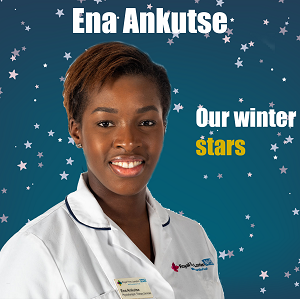
Ena Ankutse
The physio pioneer
Ena Ankutse is a physiotherapist and part of the rapid response team who work across the emergency department (ED), rapid assessment triage (RAT) and the adult treatment area (ATA).
“The earlier a therapist gets involved with patients the better. We are heavily involved with discharge planning and have that ‘home first’ mentality. There’s a lot of support that can be provided in the community and we know how important it is to limit the amount of time older patients spend in hospital because they do so much better in their own surroundings.
“Recently, we’ve been working on a pilot project with London Ambulance Service to start taking therapy assessments literally as soon as the patient arrives, so we get that opportunity to handover with ambulance staff who may have been in our patients’ homes. We can then find out much more about our patient and what their needs are.
“The key for us is that patients don’t develop that hospital mind set. We want to get people up and moving as quickly as possible and back home within hours, if possible, not days.”
My wish for 2019: “It’s about us all being on the same page and being very clear that there are lots of patients who don’t need to be admitted because we know that’s actually better for them.”
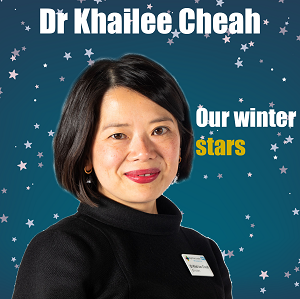
Dr Khailee Cheah
The TREAT star
Dr Khailee Cheah a consultant geriatrician, leads the Camden care homes liaison service and is part of the triage and rapid elderly assessment team (TREAT).
“I see older patients through the whole pathway, from A&E, on the ward and back into the community. The ideal solution is if we can access an emergency package of care which links them with the right community support to ensure they get the care they need, when they need it, and to hopefully avoid re-admittance.
“We provide rapid access hot clinics which GPs can refer patients to or if they’ve come via A&E we can schedule them in for a follow-up appointment. This is to enable a patient’s safe return home without the need for hospital admission.”
My wish for 2019: “We are working together with London Ambulance Service, A&E and other teams to have the ability to be able to reroute patients who fall at home and call an ambulance but in fact aren’t seriously injured, to instead come in direct to our hot clinic and avoid A&E. I’d like to see this new pathway realised.”

Max Marshall
The operations master
Max Marshall is an operations manager. He wants to ensure more patients are leaving hospital when they are ready to go (and that’s not all at 5pm!).
“We want to get our patient up on the wards from a well-controlled, safe emergency department, rather than one that is over-stretched. This is far better for the patient. But of course it means that we need those beds available.
“We know it can be done. You can anticipate your TTAs (medicines to take away) the day before so it’s ready for the patient first thing the following day. Plus, if you book patient transport for before midday, additional vehicles will be allocated to the hospital meaning patients can get home faster. Book later in the day, and the patient will face a much longer wait.
“From the staff making clinical decisions, to those carrying them out and those sorting out the logistics, it’s everyone’s responsibility to discharge effectively. Make sure patients don’t miss their time slots to go to rehabilitation, nursing homes or to meet their carers. The discharge lounges need to be used effectively – there’s still lots more capacity there. An added incentive is your patients will get get their medication quicker in the lounge as patients there get priority for TTAs and patient transport.”
My wish for 2019: “Patients back home for lunch. Get those TTAs done!”
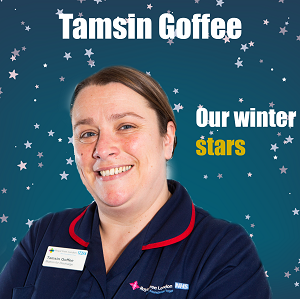
Tamsin Goffee
The discharge specialist
Tamsin Goffee is a discharge matron and leads a team of 11 flow co-ordinators and also a ‘complex’ cases team.
“Planning is the key thing. There should ideally be a plan in place for discharge from the day of admission. It could be as simple as knowing that the patient has keys to get into their house or they’ve got clothes to wear home and especially over the Christmas period we need to understand how to reach the patient’s family or support network. It’s about managing expectations so that a patient knows that as soon as they are well enough they will be leaving.
“The patient flow co-ordinators are on the wards all day, every day and are part of the multi-disciplinary team. But all members of staff should feel empowered to have the conversation with their patients about how the hospital works and put a plan together for discharge. The truth is the vast majority of people don’t want to stay in hospital and with our assistance they can leave.”
My wish for 2019: “I’d like to see staff empowered and reassured by the new choice policy which outlines to staff and patients how we plan for discharge.”
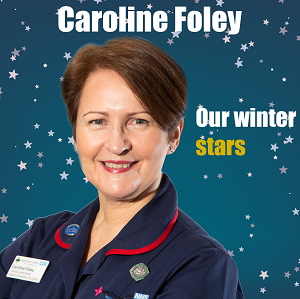
Caroline Foley
The infection control guru
Caroline Foley is an infection control matron. She is passionate about protecting staff and patients from infection and urges us to all play our part this winter.
“If you haven’t had your flu jab yet, why not? I’d urge you to take a look at all the questions and answers and myth busters which are listed on the flu page on Freenet and for flu vaccinators to take that with them when they are trying to encourage people to have the jab so they can refer to it.
“Of course the big one we hear is ‘I’m fit and healthy, I never get ill’ but flu has zero respect for that. Those of us who are fit and well with no underlying health conditions can also be hit very hard by it. There’s also a risk to patients if a service is impacted. There’s a risk that surgery or appointments could have to be cancelled because of staff shortages.
“I also want staff to remember their hand hygiene and to do it properly every time they attend to a patient.”
My wish for 2019: “First and foremost we should ‘do no harm’. I don’t want any of our staff to compromise patient care or their own. Get your flu jab and practise ‘mindful’ handwashing.”
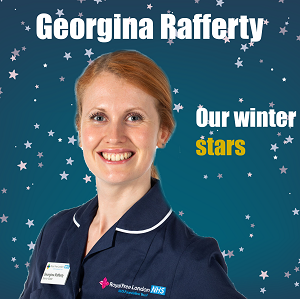
Georgina Rafferty
The AAU ace
Georgina Rafferty is a senior sister and adult assessment unit (AAU) navigator. The 24-bed AAU takes patients from the emergency department (ED) who are not yet ready to go home but don’t need to be admitted to a specialist ward.
“My role is to identify the most appropriate patients in ED and pull them through into the available AAU beds. They might just need a little more time to be back on their feet, or waiting for test results before a clinical decision is made, so we expect to discharge our patients within 24 hours.
“We help maintain the flow through the hospital, freeing up capacity at the front door in A&E.
“We know that people tend to have better outcomes if they can be looked after at home, settled in familiar surroundings. So I spend a lot of my time supporting the team to get everything in place for discharge.
“Crucially, we have twice-daily multidisciplinary meetings which include occupational therapists, physiotherapists, social workers and the TREAT team. That means we can join forces to unblock any barriers that are stopping people from going home.”
My wish for 2019: “I hope we continue building on the good communication between wards.”
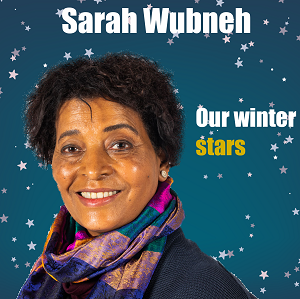
Sara Wubneh
The ‘hospital to home’ hero
Sara Wubneh is one of two British Red Cross support workers operating across BH and RFH. The Red Cross provides assisted discharge services and home from hospital visits.
“Our aim is to help patients to regain their confidence and independence so they can get back on their feet sooner, and keep themselves well at home.
“We provide emotional support, usually for older, more vulnerable patients. We get to know them on the wards and can help to reduce anxiety and help encourage them to get up and dressed as part of the drive to end ‘PJ paralysis’ and boost patient recovery.
“When it comes to discharge we help fill the gap between health services and social care. We can escort patients home and settle them in.
“We make sure they are comfortable and have everything they need and then hand over to the home from hospital team.
“The last thing anyone wants is for them to get worse and end up calling 999 or needing to come in to hospital again.”
My wish for 2019: “We all need to keep networking, so we know what we can do to help each other, what information we need to pass on and when.”
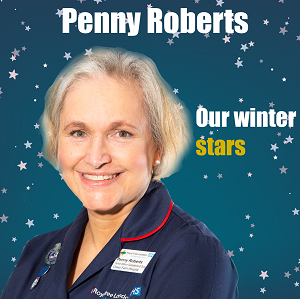
Penny Roberts
The flu jab champion
Penny Roberts, matron for surgery and outpatients, is one of our champion flu jabbers, having already vaccinated more than 100 colleagues.
“The flu vaccine is really important to me because I want to look after my staff and my patients. I want my team to stay fit and healthy so they can protect themselves, their families and the people in our care.”
Asked about the secret to her success, Penny said: “There’s no secret. I take it upon myself to talk to every member of my team about getting vaccinated. It has to be their choice, but I want to make sure they have all the facts. Some people still think that if they’re fit and young they don’t need the jab. But we know from previous years that otherwise healthy people can become seriously ill from the flu.
“I’ve even managed to persuade people with a needle phobia to have the jab. Once they understand just how important it is. If you know someone who hates needles then ask them if they would like you to be their flu buddy and go with them – it really is that important.”
My wish for 2019: “Getting vaccinated is important, but we also need to live well, eat well, sleep well, exercise and keep a good work-life balance. We can’t look after our patients if we don’t look after ourselves.”
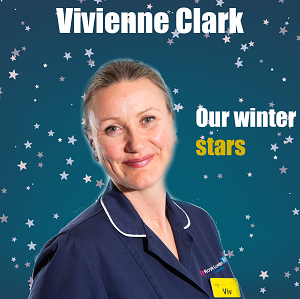
Vivienne Clarke
"The Perfect Ward" advocate
Vivienne Clarke, is a senior matron on MSU, a 48 bed unit where half the patients are over 80 and often very unwell with conditions such a sepsis and acute kidney injury. She’s an advocate for the new ‘Perfect Ward’ app.
“The Perfect Ward app gives us the tools to improve our performance immediately. Instead of paper-based audits which just end up in a file, or need a lot of number-crunching and analysing, we can upload data and share the results instantly. This means we can make improvements in ‘real time’.
“Getting the daily fundamentals right – like making sure we’re getting our patients up and moving and ensuring they are getting the nutrition they need - means our patients benefit. The app makes sure we’re on track.
“Sometimes it can be hard for staff to understand the bigger picture but with this app all our staff will be able to see what we are doing really well and what we need to do improve on and how this translates into better care for our patients. It’s a really exciting development as it really does put the focus back on patient care.”
My wish for 2019: “I want all ward staff to be confident using the Perfect Ward app so that it becomes second nature.”
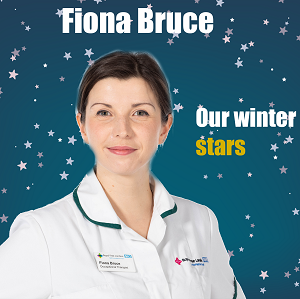
Fiona Bruce
The OT specialist
Fiona Bruce, is an occupational therapist in the emergency department. She says her role is to try to prevent emergency hospital admission for people who are medically fit to go home.
“My ‘home first’ ethos is paramount. It’s a lot about problem solving and liaising with community services to try and avoid admission. We know that 10 days in a hospital bed over the age of 80 – whether that’s acute or community - equates to about 10 years of ageing, so it’s so important that we do everything in our power to keep people at home. If you’re in hospital you are more vulnerable to infection, muscle wastage and pressure sores.
“I’m here to make sure patients have got the equipment they need at home and assess any risks there. As OTs we work closely with the physio and teach each other aspects of our roles. The more closely we can work with community teams the better as we can prevent between 70-80% of hospital admissions and our average is higher than other trusts.
My wish for 2018: “You can see the penny dropping with patients when you explain why we want to keep them out of hospital. Let’s all champion that vision so patients aren’t here if they don’t need to be.”
The marvellous infection prevention and control team
The infection prevention and control team
The infection prevention and control team were nominated as winter stars for their tireless and expert support to help colleagues keep our patients safe.
The team is on hand to advise ward staff how to prevent the spread of infection. This is particularly important at this time of year, when we see the vast majority of cases of flu and norovirus.
Norovirus is dangerous for frail patients and deeply unpleasant for anyone who gets it. Outbreaks of the illness can quickly close wards, cutting patients off from their visitors and significantly affecting our ability to admit new patients who need our care.
The infection prevention and control team support staff to maintain the highest standards of hand hygiene and other precautions. They are particularly vigilant at this time of year, helping to identify when it is appropriate to isolate patients and how to manage any outbreaks. They work closely with the site operations teams, to maintain capacity and flow.
The patient environment dream team
RFH patient environment team
The RFH patient environment team have been nominated as winter stars for their hard work keeping the hospital clean and safe for patients, visitors and staff. They work hard all year round, but especially so at this, the busiest time of year.
The team manages the day-to-day domestic cleaning routine across the hospital and works with ward staff to monitor and maintain cleanliness standards. Deep clean specialists work through an annual cleaning programme and respond to decontamination requests.
In addition, the rapid response team is always on call, ready to support ward staff with turnaround when patients are discharged. They play a vital role in maintaining patient flow through the hospital, making sure that beds are ready for new patients as soon as possible, maximising our available capacity.
They were nominated as winter stars by infection prevention and control clinical lead nurse Vicky Pang. Vicky said: “These winter stars are part of our massive hard working patient environment team. They keep our hospital sparkling clean and safe. Their rapid response is a vital part of how we’re working together across the hospital to manage winter.”
 Translate
Translate
